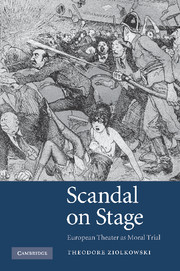5 - Diagnosing the present
Published online by Cambridge University Press: 08 January 2010
Summary
DANCING TOWARD THE ABYSS (SCHNITZLER'S REIGEN)
It has been plausibly suggested that “probably no other dramatic work of world literature has aroused through its scandals such a sensation internationally as Arthur Schnitzler's Reigen.” Most members of the literary public in Europe and the USA have by now been exposed to the work in one form or another: in its original German; in French films directed by Max Ophüls (La Ronde, 1950) or Roger Vadim (La Ronde, 1980); on stages or in campus theaters in England and across the USA as Hands Around (1920), La Ronde (1955), Rondelay (1969–1970), and under other titles; or in one of various modernizing adaptations, such as David Hare's The Blue Room (1998). All too often overlooked in the controversy over its “pornographic” aspects, however, are the literary qualities of this little dramatic masterpiece, which amounts to a sparkling miniature of fin-de-siècle Vienna at the end of what has been called “Schnitzler's Century.”
Arthur Schnitzler (1862–1931) is wholly a product and representative of the Viennese culture that he piercingly and often scathingly, but always insightfully, portrays in his plays, stories, and novels. The son of a successful physician, a laryngologist who founded the Internationale Medizinische Rundschau, Schnitzler enjoyed a classical education at Vienna's noted Akademisches Gymnasium and then studied medicine at the University of Vienna.
- Type
- Chapter
- Information
- Scandal on StageEuropean Theater as Moral Trial, pp. 85 - 112Publisher: Cambridge University PressPrint publication year: 2009



